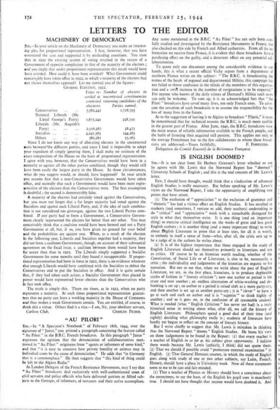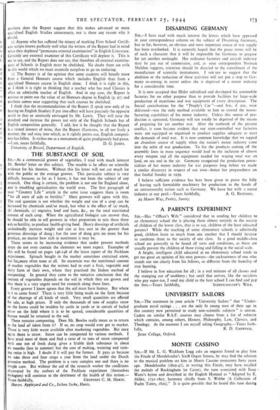IS ENGLISH DOOMED ?
SIR,-It is not clear from Sir Herbert Grierson's letter whether or not he agrees with Mr. Lewis that the Norwood Report has " doomed " University Schools of English ; and this is the real concern of Mr. Lewis's letter.
Few, I should have thought, would think that a vindication of advanced English Studies is really necessary. But before speaking of Mr. Lewis's views on the Norwood Report, I take the opportunity of amplifying two points that have arisen.
(t) The exaltation of " appreciation " to the exclusion of grammar and " rhetoric " has had a vicious effect on English Studies. It has resulted in students (and sometimes, I venture to add, their teachers) undertaking to do " critical " and " appreciative " work with a remarkable disregard for style in what they themselves. write. It is one thing (and an important thing) to exercise critical intelligence on the works of great and less great English authors ; it is another thing (and a more important thing) to write about Ehglish Literature in prose that at least tries, for all it is worth, to embody in itself a sense of form—what, after all, the critic sets up to be a judge of in the authors he writes about.
(2) It is of the highest importance that those engaged in the study of English Literature should see themselves primarily as historians and not as critics. Of course to be an historian worth reading, whether of the Constitution, of Social Life or of Literature, is also to be, necessarily, a critic ; the individuality and judgements of the historian are organic to hi*. narration. But not to see that, when we write about the past of English Literature, we are, in the first place, historians, is to produce deplorable cycles of fashion in " literary criticism "; now one author or period is the craze and now another ; an endless alternation of white-washing and de- bunking is set up ; an author or a period is raised aloft as a mere party-cry, and then another is set up as another party-cry ; it is " clever " to have a
go at such and such an author and it is " superior " to think highly of another ; and so it goes on, to the confusion of all reasonable counsel. What is needed (what " English Criticism " has never yet had) is a truly historical sense in writing about what, after all, we call the history of English Literature. Philosophers spend a good deal of their time (and rightly) deciding what philosophy really is ; students of literature have hardly yet begun to reflect on the concept of literary history. But I write chiefly to suggest that Mr. Lewis is mistaken in thinking
that the Norwood Report " dooms " English Studies. He bases his'view on three judgements to be found in the Report: (z) that every teacher is a teacher of English in so far as his subject gives opportunity. I italicise these words because Mr. Lewis (unfairly, I think) did not quote them. (2) That we should if possible avoid " premature external examination " in English. (3) That General Honours courses, in which the study of English goes along with study of one or two other subjects, say Latin, French, History, should have a place in University work. Now all these statements seem to me to be just and fair-minded.
(t) That a teacher of Physics or History should have a conscience about the correctness, to say the least, of the English his pupil uses is manifestly true. I should not have thought that anyone would have doubted it. And nowhere does the Report suggest that this makes advanced or more specialised English Studies unnecessary, nor is there any reason why it should.
(z) Anyone who has suffered the misery of marking First School Certifi- cate scripts knows perfectly well what the writers of the Report had in mind when they deplored "premattireexternal examination" in English Literature. Certainly any external examiner of this Certificate will deplore it. This is not to say, and the Report does not say, that therefore all external examina- tions of Schools in English must be abolished. No doubt there are evils in this world which we must reconcile ourselves to go on enduring.
(3) The Report is of the opinion that some students will benefit more from a General Honours course which includes English than from a specialised Honours course in English alone. I think it is right in this, as I think it is right in thinking that a teacher who has read Classics is often an admirable teacher of English. And in any case, the Report is anxious to point out the value of an Honours degree in English (p. 97) and nowhere comes near suggesting that such courses be abolished.
I think that the recommendations of the Report (I speak now only of its bearing on English Studies) if put into effect will have precisely the opposite result to that so anxiously envisaged by Mr. Lewis. They will raise the standard and increase the power not only of the English Schools but of English composition generally. I add, lest it be thought that the Report is a vested interest of mine, that the Report illustrates, in all too lively a manner, the sad state into which, as it rightly points out, English composi- tion has fallen. It strikes me as a monument of quite prodigiously bad prose.



























 Previous page
Previous page